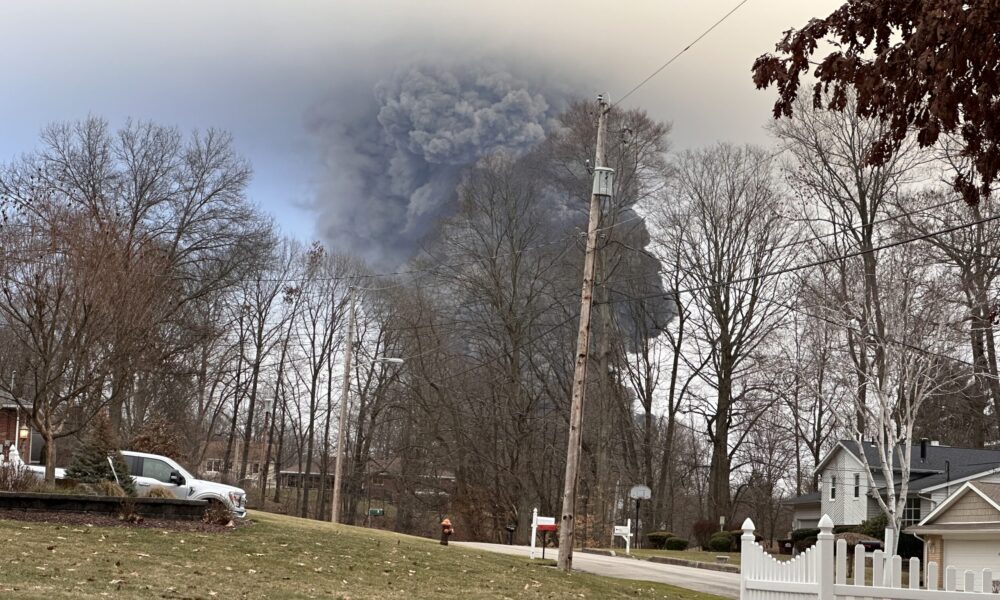Two years ago, the Norfolk Southern freight train derailed in East Palestine, Ohio. It caused multiple cars of hazardous materials – including vinyl chloride – to catch fire or spill into adjacent ditches and streams that feed into the Ohio River. As explained by my colleague, the Trump administration could, if they chose to, strengthen rail and chemical disaster regulations to help prevent these disasters from happening in the future.
But to understand and respond to crises like this—and to craft smart, effective rules to prevent them—we need scientists and experts working within the federal government to be able to follow the evidence wherever it leads and speak honestly to the public about what they’ve found. In short, we need to ensure scientific integrity.
The US Environmental Protection Agency (EPA) finalized their revised Scientific Integrity Policy at the end of the Biden Administration, which included protections of science from political interference. There are ways that scientific integrity policies – like those that are currently being targeted by this administration – could have helped avert the harm to communities in the aftermath of the train derailment.
What is scientific integrity and how was it violated?
Scientific integrity protections help ensure that science at federal agencies is protected from political interference or distortion and available to the public. Scientists can provide scientific information and findings, within their agencies and with the broader public, to inform and guide policy decisions that protect people’s health and natural resources. These protections keep science independent and reliable for all of us.
In the response to the East Palestine train disaster, however, the agency fell short of this promise. EPA conducted air monitoring to document effects of the disaster using airborne spectral photometric environmental collection technology (ASPECT). In this process, a plane uses photographic imagery and scans to collect measurements of toxins and report real-time data from airborne chemical or radiological materials. In this case, ASPECT was used to scan and detect vinyl chloride, an odorless gas that is used to make plastic and vinyl products. When people are exposed to these chemicals, that exposure is associated with changes to the central nervous system (CNS), liver damage, and increased risks of cancer.
EPA staff were instructed by a program manager to falsify procedures and data collection records written after ASPECT’s mission. EPA failed in its mission to protect the public and failed to follow ethical research protocols. ASPECT operators were also instructed to turn off sensors over two streams near the derailment, both of which were found to be contaminated. In addition, the plane flew days after the derailment and only conducted two flights that resulted in eight minutes of data. ASPECT can respond within one hour of notice and missions often include multiple flights over a contaminated area to collect hours of data.
The decision to deploy ASPECT took place after Norfolk Southern decided to vent and burn the vinyl chloride, using explosive charges to create holes in the cars carrying the hazardous material, based on their chemical ground sensor data. According to the Federal Railroad Administration, vent and burn operations are used to relieve internal vapor pressure from flammable or combustible gas or to drain hazardous liquid material from a railcar. During testimony before Congress, the National Transportation Safety Board revealed that their investigations determined that the vent and burn operation was not necessary.
Lastly, EPA published a report on ASPECT’s response to the East Palestine derailment. The report claimed vinyl chloride and other toxic chemicals were below levels of concern and the controlled vent and burn operations were a success.
Why does scientific integrity matter?
The East Palestine derailment incident was a disaster. But local ecosystems and the community’s health were endangered even more because of EPA’s scientific integrity violations–notably, the EPA program manager’s changes to protocol, the insufficient data resulting from late deployment of ASPECT with limited runs, and the directives to falsify data. ASPECT was unable to provide multiple hours of findings to help officials to make appropriate decisions and keep the community informed with the best available evidence. In addition, Norfolk Southern’s decision to carry out a “controlled” vent and burn (before ASPECT was deployed) released toxins into the air and local water systems, which harmed locals, animals, and the environment.
How the Scientific Integrity Act would help
EPA officials made decisions that failed to adequately protect community members during this disaster. People living near the crash site were exposed to toxic chemicals, and the studies of these exposures won’t provide results on the potential health impacts for years.
EPA’s revised scientific integrity policy could have prevented political and data interference with emergency response to the East Palestine train derailment. The revised policy specifically prohibits research misconduct, and the interference, inappropriate influence, suppression, or delay by any entity in the science activities, information, or processes at EPA. Scientific integrity policies, which clearly lay out these rules and provide a pathway to hold violators accountable, would make the agency more effective at its mission.
Unfortunately, we’re speeding in the wrong direction. Federal scientific integrity policies are under attack by the Trump Administration. That’s a chilling development that reverses much-needed progress. Violations of scientific integrity have taken place since President Eisenhower, with 326 violations occurring over the last four presidential administrations—the majority of which occurred during the previous Trump administration. These policies are sorely needed.
Thankfully, a new a bill introduced in the U.S. Congress—the Scientific Integrity Act– would establish requirements for scientific integrity policies in federal agencies, protect science, and address the challenges and attacks we have seen previously. The legislation would ensure agency’s scientific integrity policies have the force of law, making it more likely that attacks on science are prevented or remedied when they happen, no matter who runs the White House or federal agencies. The bill specifically prohibits suppression, interference, or alteration of scientific findings or targeting scientists for retribution based on their findings. More importantly, protecting science helps those most vulnerable to harmful exposure to pollution and toxins.
The Scientific Integrity Act would codify scientific integrity protections at the national level, establishing the strongest protections for federal scientists and their work we have ever seen in modern history. Specifically, the bill:
- Requires federal agencies that fund or direct public science to establish and maintain clear scientific integrity principles. More than 20 federal agencies currently have some form of scientific integrity policy that would be made stronger under this bill.
- Formalizes these policies and strengthens them with the force of law. The act clarifies that science should determine policy, free from political interference, ideology, or financial conflicts of interest.
- Holds public scientists to the highest standards while guaranteeing their rights and protections under the law.
The bill also requires each agency to appoint a Scientific Integrity Officer, establish a dispute resolution process, and establish training for new and current staff on scientific integrity policies.
In the case of the East Palestine derailment, the Scientific Integrity Act would have deterred agency leadership from interfering with scientific processes and conclusions–specifically the alteration or interference on data collection and findings, as occurred with the ASPECT data flight missions.
What can you do?
Last week, EPA Administrator Lee Zeldin and Vice President JD Vance visited the East Palestine disaster site and stated, This administration will fight hard to make sure every American has access to clean air, land, and water.” Unfortunately, the Trump Administration has “”enforced a gag order on public health communications, and placed a freeze on federal grants. Despite their rhetoric, the reality is that they’re reducing the tools we have to understand and remedy crises like the derailment.
Protecting scientific integrity has never been more important as scientists and science-based policies come under attack. Now is the time to mobilize and act. Here are a couple of ways to help:
- Contact your member of the U.S. House of Representations (or by using this fast action link) and ask them to cosponsor the bipartisan Scientific Integrity Act and/or urge them to pass the bill.
- Contact your members of the U.S. House of Representatives and U.S. Senate to let them know you support trustworthy, independent federal science and won’t stand for efforts to attack it.

